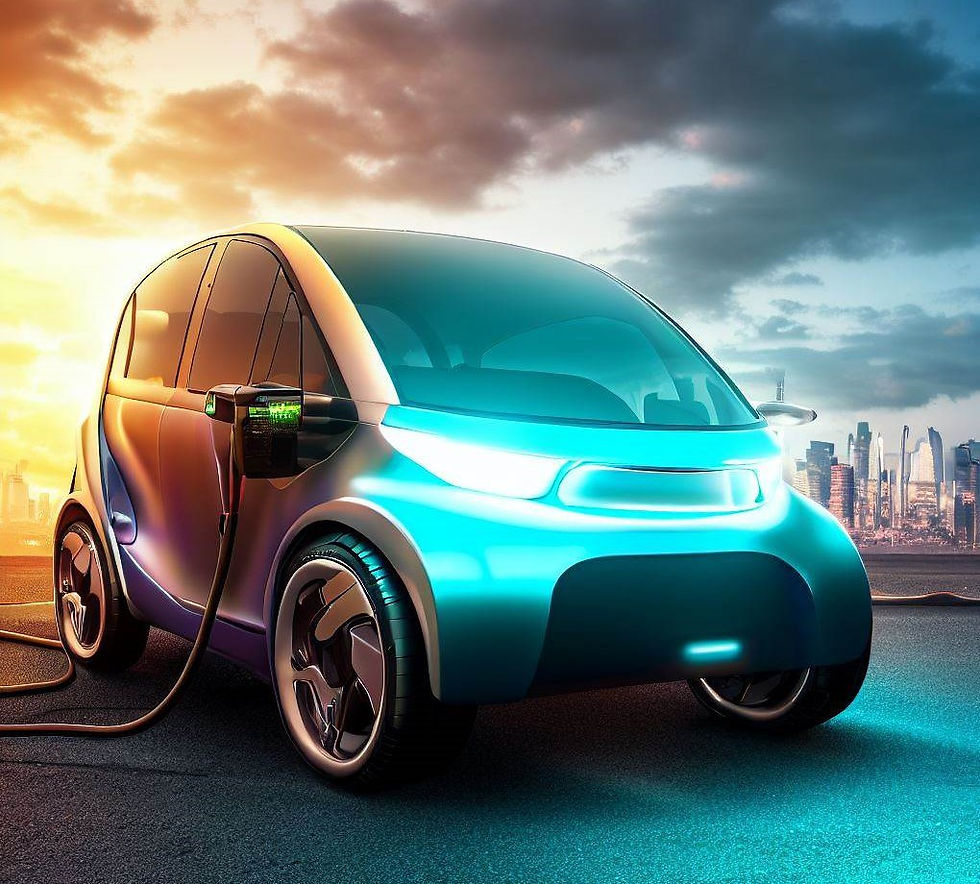Electric Vehicles: Shaping the Future of Transportation
- bharatarora04
- Jun 22, 2023
- 3 min read
Updated: Jul 11, 2025
#electricvehicles #electriccars #electricmobility #emobility #sustainabletransportation #greentransportation #zeroemissions #cleanenergy

Introduction
In recent years, the automotive industry has witnessed a significant shift towards sustainability and efficiency. Electric Vehicles (EVs) have emerged as a promising solution to combat the environmental challenges posed by conventional gasoline-powered cars. With advancements in technology and a growing emphasis on reducing carbon emissions, EVs are paving the way for a greener and cleaner future. This article explores the key advantages and benefits of electric vehicles, highlighting their potential to revolutionize the transportation industry.
The Rise of Electric Vehicles
In recent years, the adoption of electric vehicles has experienced exponential growth. Governments, organizations, and individuals are recognizing the potential of EVs to reduce greenhouse gas emissions and combat climate change. With advancements in battery technology, electric vehicles have become more affordable, reliable, and accessible to the masses. The market is witnessing an influx of electric car models from established automakers and new entrants, indicating a paradigm shift towards sustainable transportation.
Environmental Advantages of Electric Vehicles
Electric vehicles have a profound impact on reducing air pollution and dependence on fossil fuels. By eliminating tailpipe emissions, EVs contribute to cleaner air quality and help mitigate the adverse effects of vehicular pollution on public health. Furthermore, electric vehicles produce zero direct emissions, making them an attractive alternative to internal combustion engine (ICE) vehicles. The adoption of EVs on a global scale can significantly reduce carbon dioxide emissions and combat climate change.
Cost and Financial Benefits
While electric vehicles may have a higher upfront cost compared to conventional cars, they offer long-term financial benefits. EV owners can take advantage of lower operating costs, reduced maintenance expenses, and potential government incentives. Electric vehicles have fewer moving parts and require less maintenance than traditional vehicles, resulting in lower servicing costs. Additionally, the price of electricity for charging an EV is generally lower than the cost of gasoline, leading to significant savings on fuel expenses.
Technological Advancements in Electric Vehicles
The rapid advancements in technology have led to substantial improvements in electric vehicles. Battery technology, which is crucial for the performance and range of EVs, has witnessed significant progress. Lithium-ion batteries, the primary energy storage solution for electric cars, have become more efficient, compact, and cost-effective. Moreover, research and development efforts are focused on enhancing battery capacity, charging speed, and overall durability. These advancements are driving the growth and acceptance of electric vehicles worldwide.
Charging Infrastructure and Range Anxiety
One of the concerns associated with electric vehicles is range anxiety—the fear of running out of battery power during a journey. However, the expansion of charging infrastructure is addressing this challenge. Governments, businesses, and electric utility companies are investing in the development of public and private charging stations, making it easier for EV owners to recharge their vehicles. The availability of fast-charging stations and improved battery technology is significantly reducing range anxiety and enhancing the convenience of electric vehicles.
Government Initiatives and Support
To accelerate the adoption of electric vehicles, governments around the world are implementing various initiatives and providing incentives. These include tax credits, rebates, and subsidies for purchasing electric vehicles. Additionally, governments are promoting the installation of charging infrastructure, facilitating research and development in battery technology, and introducing regulations to limit carbon emissions from vehicles. The combined efforts of governments, manufacturers, and consumers are driving the growth of the electric vehicle market.
Overcoming Challenges: Battery Technology
While battery technology has made significant advancements, there are still challenges to overcome. The limited range of electric vehicles and the time required to recharge batteries remain areas of improvement. Researchers and engineers are working on developing next-generation batteries with higher energy densities and faster charging capabilities. Breakthroughs in battery technology will further enhance the appeal and practicality of electric vehicles, making them a viable option for long-distance travel.
Electric Vehicles and the Sharing Economy
The rise of the sharing economy has opened up opportunities for electric vehicles. Car-sharing and ride-sharing platforms are incorporating electric vehicles into their fleets, offering users the convenience of environmentally friendly transportation on demand. Electric vehicles are well-suited for short-distance trips and urban commuting, making them ideal for the sharing economy model. By promoting the use of electric vehicles in shared mobility services, we can further reduce the environmental impact of transportation.
To Summarize - Electric vehicles represent the future of transportation, offering numerous advantages in terms of sustainability, cost-effectiveness, and technological innovation. As we strive to reduce our carbon footprint and create a cleaner environment, the adoption of electric vehicles plays a pivotal role. With continued advancements in battery technology, charging infrastructure, and government support, electric vehicles will become more accessible, practical, and integrated into our daily lives. Embracing electric vehicles today is a step towards a greener and more sustainable future.




Comments